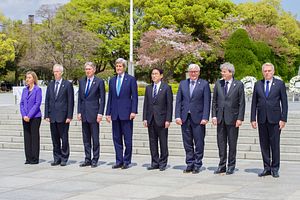After two days of meetings in Hiroshima, Japan, the foreign ministers of the seven states in the so-called G-7, a group comprising Canada, France, Germany, Italy, Japan, the United Kingdom, and the United States, issued a joint statement on maritime security, addressing a range of global issues. In addition to voicing support for international law—specifically, the United Nations Convention on the Law of the Sea—and the freedom of navigation, the G7 ministers’ statement voiced concern regarding the “situation in the East and South China Seas.”
The G7 ministers’ statement added that the group opposed “any intimidating, coercive or provocative unilateral actions that could alter the status quo and increase tensions, and urge all states to refrain from such actions as land reclamations including large scale ones, building of outposts, as well as their use for military purposes and to act in accordance with international law including the principles of freedoms of navigation and overflight.” In essence, the statement described in great detail what China has been doing in the Spratly Islands for the last two years—all without naming Beijing.
An important difference between this year’s ministerial statement on maritime security and last year’s leaders’ declaration in Germany is the addition of more specific language regarding the “building of outposts” and their “use for military purposes.” Last year’s leaders’ declaration called out land reclamation in the South China Sea, but did not go further in specifically voicing opposition to other activities. Satellite imagery over the past year has shown steady progress on military outposts and airstrips on Chinese-occupied features in the Spratly Islands.
Unsurprisingly, the Chinese foreign ministry strongly voiced its objection to the G7 ministers’ statement. Lu Kang, a spokesperson for the Chinese foreign ministry, noted that China was “strongly dissatisfied with relevant moves taken by G7.” Lu urged “G7 members to abide by their promise of not taking sides on territorial disputes, respect the efforts by regional countries, stop all irresponsible words and actions, and make constructive contribution to regional peace and stability.”
“Given the sluggish global economic recovery at the moment, G7 should have focused on global economic governance and cooperation instead of hyping up maritime issues and fueling tensions in the region,” Lu added.
The language in the 2016 G7 ministers’ statement on maritime security is largely a rehashing of a similar statement by G7 leaders last year, made after their meetings in Germany. In 2014, when the G7 met in Brussels, the leaders similarly voiced their concerns about maritime tensions in the East and South China Sea.
The Hiroshima statement once again reiterated support for the G7 foreign ministers declaration on maritime security in Lübeck, Germany, which, among other points, voiced considerable support for the conclusion of the ASEAN-China Code of Conduct in the South China Sea. The presumptive plurilateral agreement has stagnated amid continuing difficulties between China and South China Sea claimants within ASEAN—a group including Malaysia, Brunei, Vietnam, and the Philippines.
Though China has reacted negatively to these statements in the past, tensions remain unusually high in the South China Sea as of early 2016, leaving Beijing highly sensitive to criticism. Additionally, Japan’s role as host for this year’s G7 meetings is a sore point for China as well. Tokyo has grown increasingly interested in outcomes in the South China Sea and has, over the past year, reached out to Southeast Asian claimants, including Vietnam and the Philippines. Tokyo’s Maritime Self-Defense Forces joined the U.S. Navy for a first-ever bilateral naval exercise in the South China Sea in October 2015.

































